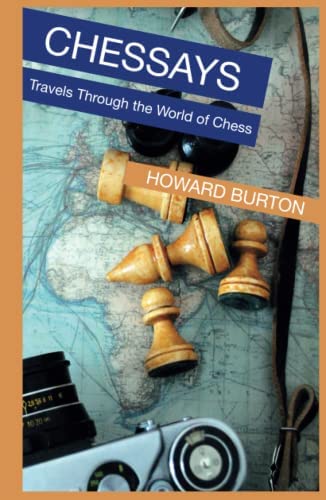Disclaimer 1: The following article contains several affiliate links to Amazon.com, meaning that if you go to Amazon and buy the recommended product (or some other product in an allotted period of time), the author of these lines will get a commission % from the purchase
Disclaimer 2: The following article is an excerpt from my article titled Best Chess Books 2022 in which I reviewed 20 chess books
Howard Burton: Chessays -Travels Through the World Of Chess
What is the book about?
Howard Burton is an independent filmmaker, author, and founder of The Ideas Roadshow, which describes itself as „an award-winning multimedia initiative dedicated to harnessing the benefits of modern technology to explore ideas across the arts and sciences through thoughtful and seriously-entertaining documentary films, books and podcasts.“ In simpler terms – a multimedia initiative that publishes books and movies produced and authored by Howard on a variety of topics from different fields, based on a series of conversations Howard conducts with experts from these same fields.
And his own research and observations.
In March 2020, Howard started working on a documentary film on the topic of chess, titled Through The Mirror Of Chess: A Cultural Exploration. By his own admission, he initially expected it wouldn’t be such a lengthy and encompassing project, but then the pandemic and the chess boom happened, and he got more and more immersed and ended up accompanying the movie with a book about the chess world titled Chessays: Travels Through the World Of Chess.
As the title suggests, the book consists of a series of essays – 8 to be exact – giving Howard’s thoughts on a variety of topics from the chess world, as follows:
- Chess history and chess historians
- Is chess a waste of time? What activities are not regarded as a waste of time?
- The cultural status of chess. Should it be regarded as a sport? If yes, under what circumstances?
- FIDE
- The eternal question of gender, sexism, male bias, female-only tournaments, and competitions
- Are chess skills transferable to other domains
- Chess as a vehicle for societal changes?
- Chess in relation to technology and artificial intelligence
In contrast to the majority of the chess books on this list, 1 this book doesn’t contain any chess moves and diagrams. It is a purely subjective, personal 2 account of the chess world from the perspective of an outsider.
Why do I love this book?
In the second half of 2022, I got contacted by Howard’s partner Irena, who mentioned he is working on a four-part documentary series about the world of chess and also writing a book. She asked me whether I would be interested in reading and reviewing the book, as well as the movie. 3 Despite my initial skepticism caused by me being a staunch chess elitist, 4 I decided to keep an open mind and read the book at the end of 2022. 5
It turned out to be one of the best decisions I have ever done since Chessays turned out to be one of the most profound, interesting, entertaining, humorous, and thought-provoking books I have ever read. Not only if we are talking about chess books, but about books in general.
It is hard to even begin to explain how and why this book is so good. I absolutely love every aspect of it, but for the sake of this article, I have singled out five characteristics that delighted me.
- Opinionation
If you have ever read any of my other articles 6 or my Twitter, you might have noticed that I am a very opinionated person and that I love shoving them wherever and whenever possible.
Part of being opinionated is very dismissive of other people’s opinions, at least when you don’t agree with them or consider them dumb. In the aftermath of the Great Chess Boom caused by the pandemic/The Queen’s Gambit, we have seen all sorts of newcomers 7 express all sorts of stupid opinions about many things related to chess. 8 Thus, when I realized that the main purpose of this book was for the author to share his opinions with a broad public (which is announced in the very introduction of the book), I was immediately intrigued and eager to find out more.
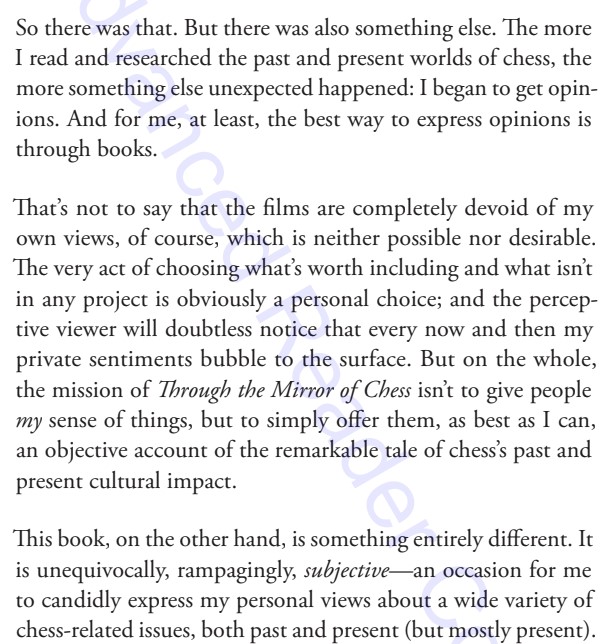
To be fair, my eagerness was very much based on my willingness to read the author’s arguments and then laugh them off. Since I didn’t do my research properly, I expected to read a superficial, half-informed account of the chess world based on a few newspaper headlines, Youtube videos, and clips from GMHikaru’s stream.
Oh boy, was I wrong. The book not only turned out to be superficial and half-informed – it turned out to be one of the most informed, meticulous, and well-researched I have ever read.
This leads me to the next point.
- Deep insights and knowledge about the chess world
One thing I didn’t immediately realize before I started reading the book is that Howard Burton is a very intelligent, meticulous, and thorough individual – which is not surprising given that, apart from his writing and filmmaking credentials, he also holds a Ph.D. in physics.
Pretty much from the very first chapter of the book devoted to chess history and chess historians, it was quite apparent that Howard has done his research and immersed himself very deeply in the chess world. Not only does he display quite big erudition related to the origins of the chess game and early publications – but already as early as page 10 he already mentions the name of the renowned chess historian Edward Winter – the founder of the website chesshistory.com – and pretty correctly recognizes his trustworthiness and credibility. 9
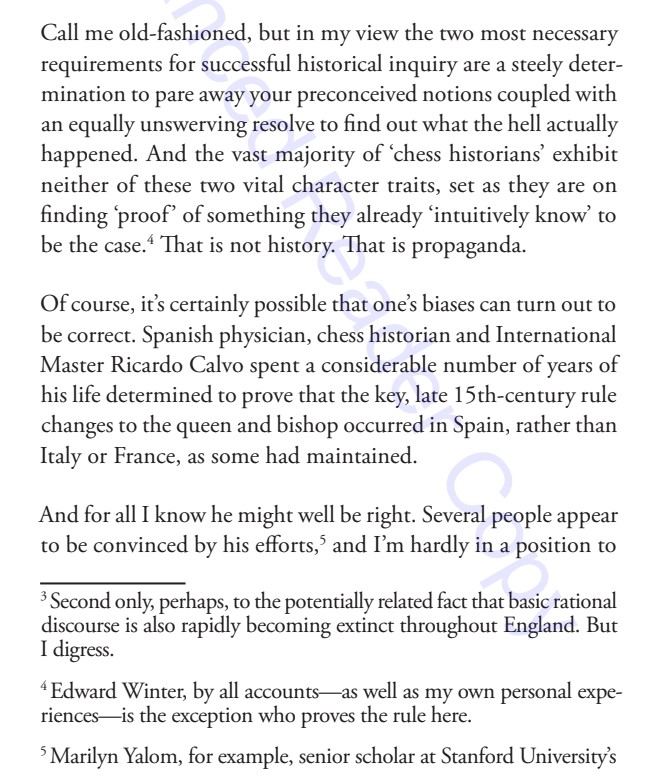
The fact that the author has done the research and is well-versed in the chess world keeps being apparent throughout the book. References are made to famous streamers, Youtubers, FIDE officials, players, historical figures, initiative leaders, and many others. Whether we are talking about Jerry from the Chessexplained Youtube channel, Arkadij Dvorkovitch or Pontus Carlsson, you can be sure that Howard has heard about them – and in many cases interacted with them.
Thus, irrespective of whether you agree or disagree with his opinions, 10 claiming that they are baseless and uninformed would definitely be unjust!
- No filter in writing
Now, considering Howard’s academic background 11 , you might expect the writing to be…well… very academic, dry and correct.
Not only is that not the case, but the writing is completely on the opposite side of the spectrum. One thing I really like about Chessays is the fact that Howard has absolutely no filter. If there is an opinion/point to be made, Howard will make it very directly and succinctly, without beating behind the bush or caring whether someone might get offended in the process.
One of the favorite groups Howard likes to insult is chess players themselves. As early as page six, we get the taste of what is to come:
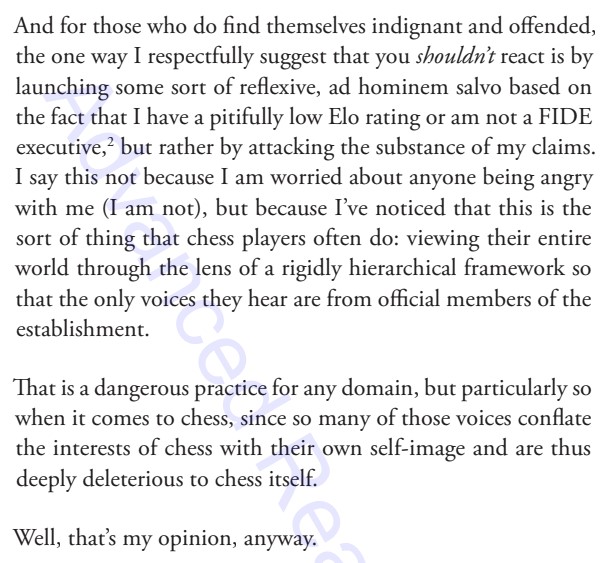
Slightly later, on page 28, we get another round, but this time we share the burden with the respected citizens of the United States of America:
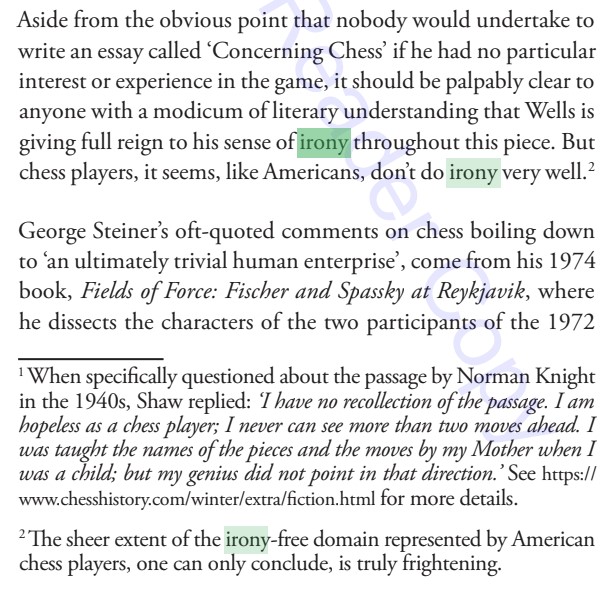
I think by this point, it has become clear that, if Howard thinks someone deserves to be called an „idiot“, you can be sure he will let you know, irrespective of what their name or status within the chess world is. And while calling Nigel Short an „idiot“ might not be very revolutionary:
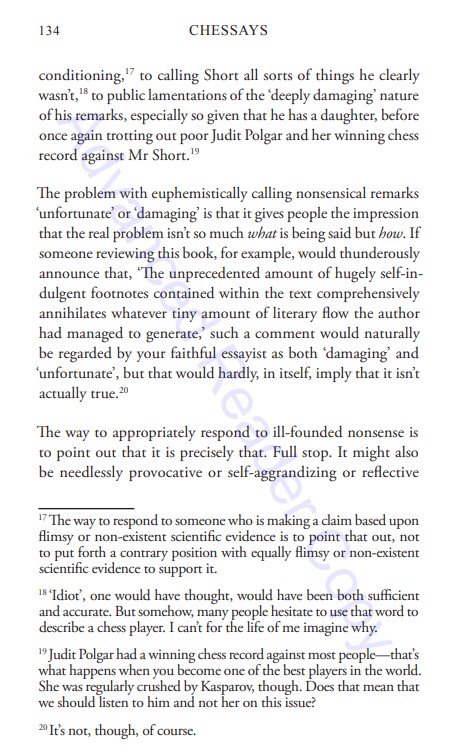
expressing very harsh, yet well-founded and reasonable criticism of Garry Kasparov is not something you have the opportunity to read every day:
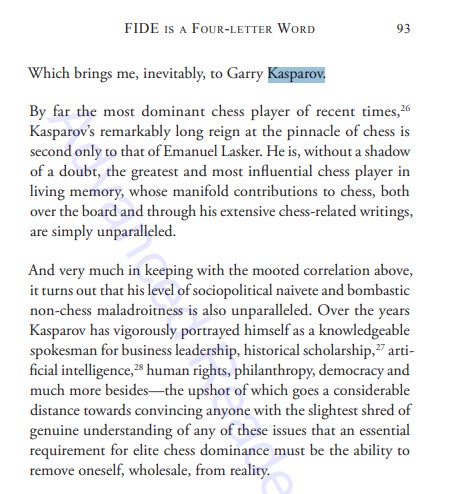
Of course, some people might be immediately put off by this „Talebian“ language, 12 but I honestly find this candid and open writing style endlessly entertaining and refreshing in the era where everyone is treading so carefully and trying oh-so-hard to be politically correct at all times.
Especially since I felt that Howard is very masterfully balancing the thin edge between being funny and being purely offensive and is never really crossing it. I personally found not only these „offensive“ remarks but the book as a whole absolutely hilarious.
This brings me to the next point.
- Humour/writing style
As you might have figured from the screenshots I shared above and the general tone of the review so far – I think Chessays are absolutely hilarious. Howard strikes me as a person who doesn’t take anything – including himself – too seriously and I find his sharp remarks insightful and witty at the same time. I remember I was endlessly entertained by his comment in regard to chess historians which can be found on page 13 of the book:

One trait of Howard’s writing that reinforces the feeling of humour and jovial tone is the use of the footnotes throughout the book. As you might have figured out from reading this article, I am very fond of trying to make pitiful humoristic attempts in footnotes – and Chessays use this technique all over the place. As can be seen from the screenshots above, the majority of humorous and snarky remarks are actually hidden within the footnotes. And at a certain point in the book, the author intentionally mocks himself for that tendency:
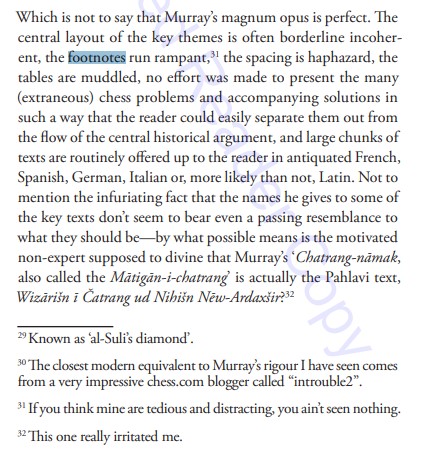
Of course, if it were only about insults and humour, this book probably wouldn’t be nearly as good as it is. However, as it usually happens – people with the innate ability to be extremely funny are often the people who have the innate ability to be extremely intelligent and profound.
This leads me to the final part of this review.
- Profound and original ideas, thoughts, and observations
From what I have written so far, you might get the impression that this book is a semi-serious, half-baked attempt to write a humoristic piece about the chess world and insult as many chess players as possible in the process and that the author doesn’t really care for the chess world as a whole.
Nothing of the sort.
Through Chessays, the author elaborates on what he thinks are some of the burning problems of the chess world that prevents its further growth and limit its potential – and tries to propose concrete solutions for solving these problems.
I can’t recall when was the last time I encountered so many profound and original ideas and potential solutions regarding some very concrete issues we are facing as a chess world. The most interesting proposal was for the chess players to find a separate organization under the auspices of FIDE:
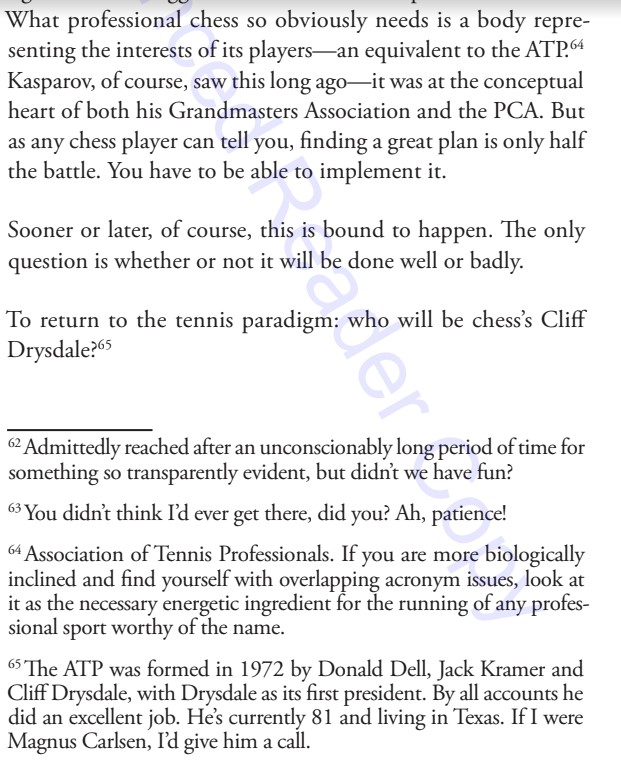
and for the female players to do the same, very much how it is done in tennis with the existence of the ATP and WTA:
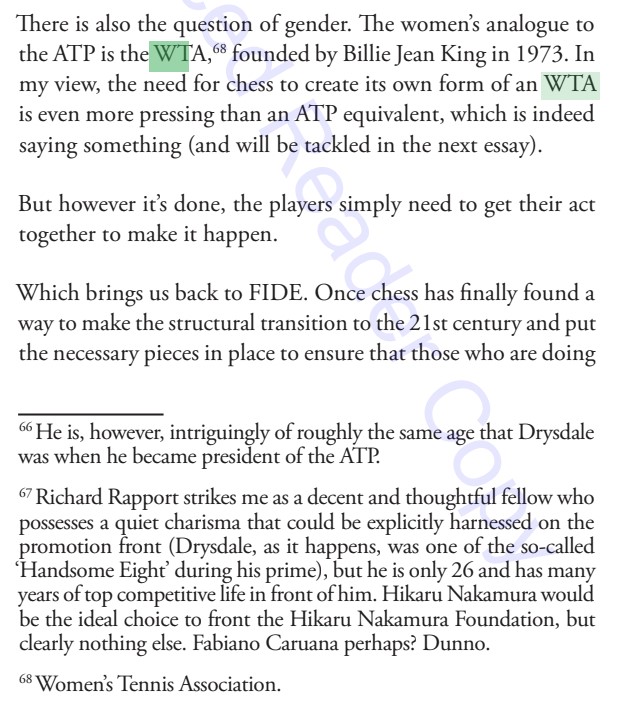
This model proposes FIDE to be more of a regulatory body, rather than an organizational body with the central power. Definitely, a profound concept that is worth exploring further.
And this is just the tip of the iceberg. Throughout the book, Howard comes up with very profound ideas and observations about a myriad of other issues, but this article would very quickly get way too long if we started to explore all of them very deeply. 13
I think it is much easier for you to read the book. I can only wholeheartedly recommend it and you will definitely not regret it!
- And not only on this list
- And very opinionated
- Once it comes out.
- I don’t want no outsiders to tell me about my world!
- With a considerable delay
- Such as the aforementioned one on chess elitism or the one where I claimed that chess is not a sport
- And not only newcomers
- Did I mention I am an elitist?
- I am sure many chess players have never heard of Edward Winter – nor showed interest in his work
- I happen to agree with quite a few, but then again, I disagree with many others
- And the fact he is a physicist!
- In case you don’t know who Nassim Nicholas Taleb is – I recommend you to check his Twitter or google Nassim Taleb Lex Fridman to find out more details about the drama that is unfolding as I write these words on 3rd January 2023.
- It will probably turn out to be too long anyway

